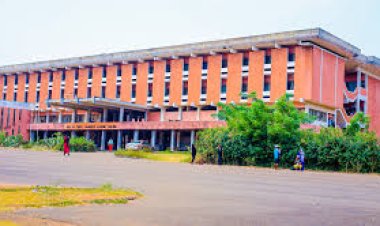University Don Proposes Five-Year Tax Exemption for Nigerian Drug Manufacturing Sector
Professor Isaac Aremu, a distinguished academic from the University of Ilorin's Department of Pharmaceutics and Industrial Sciences, has advocated for a five-year tax exemption for potential investors in Nigeria's drug manufacturing sector.

In a bid to address the escalating costs of pharmaceuticals in Nigeria, Professor Isaac Aremu, a distinguished academic from the Department of Pharmaceutics and Industrial Sciences at the University of Ilorin, has called upon the federal government to consider implementing a five-year tax exemption for prospective investors in the country's drug manufacturing sector. Aremu made these recommendations during the delivery of the 252nd inaugural lecture of the university, titled "Drug Formulation as Essential Construct for Safe Delivery."
RECOMMENDED: SSANU Honors FUTA Bursar as Honorary Member
Expressing concerns over the dependency of Nigeria's pharmaceutical industry on imported raw materials, Aremu highlighted that approximately 70 percent of the materials used in medicine production are sourced from abroad. Furthermore, he underscored recent departures of key pharmaceutical companies, such as GSK, Sanofi, and Procter and Gamble, from the Nigerian market, exacerbating the challenges faced by the sector.
Aremu emphasized the significant rise in prices of essential medications, including antibiotics and life-saving anti-asthmatic drugs, rendering them unaffordable for many Nigerians. In light of these pressing issues, he advocated for strategic interventions to revitalize the pharmaceutical landscape in the country.
Among his proposals, Aremu suggested the establishment of a herbal center within the university's medical facility or the Faculty of Pharmacy, aimed at enhancing healthcare services through herbal remedies. Additionally, he underscored the critical need for domestic production of pharmaceutical raw materials, both synthetic and herbal, to reduce reliance on imports and bolster local manufacturing capabilities.
In order to incentivize investment and stimulate growth in the sector, Aremu proposed a five-year tax waiver for willing investors, asserting that such measures would contribute to lowering production costs and ultimately lead to more affordable medications for Nigerian consumers.
As stakeholders continue to grapple with the challenges confronting the pharmaceutical industry, Aremu's recommendations underscore the importance of targeted policy interventions and strategic partnerships to promote sustainability and accessibility within the healthcare sector.

 Chris Oyeoku Okafor
Chris Oyeoku Okafor 



